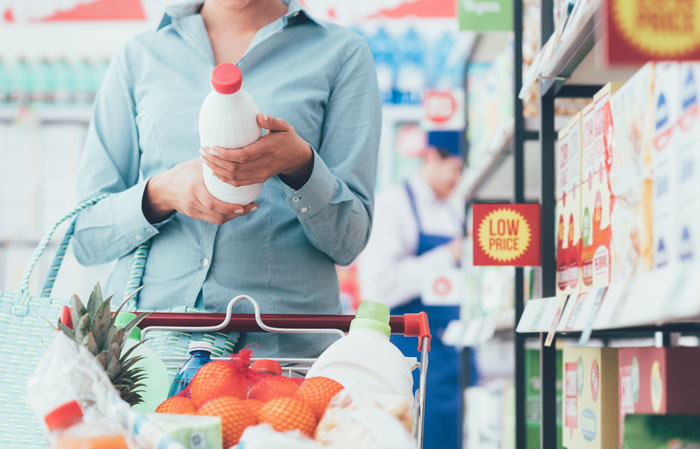Little blue fridge part of guidelines to slash Britain’s food waste
- Like
- Digg
- Del
- Tumblr
- VKontakte
- Buffer
- Love This
- Odnoklassniki
- Meneame
- Blogger
- Amazon
- Yahoo Mail
- Gmail
- AOL
- Newsvine
- HackerNews
- Evernote
- MySpace
- Mail.ru
- Viadeo
- Line
- Comments
- Yummly
- SMS
- Viber
- Telegram
- Subscribe
- Skype
- Facebook Messenger
- Kakao
- LiveJournal
- Yammer
- Edgar
- Fintel
- Mix
- Instapaper
- Copy Link
Posted: 1 December 2017 | George Smith (New Food) | No comments yet
More than two million tonnes of food are thrown out every year in the UK. A third of this waste is triggered because of how shoppers interpret existing date labels. Now a new labelling system hopes to change that.


New guidance, published this week by sustainability experts WRAP and produced in association with the Food Standards Agency (FSA) and Defra, sets out best practice in the choice and application of date labels and storage advice.
It will be used by food manufacturers, retailers and brands as the industry standard and brings together recommendations that ensure food is safe and adheres to legal requirements, with best practice information to ensure it is stored and used within time.
A new addition is the call to use helpful logos alongside text more often, which consumers find easier to understand than text alone. The organisation is calling for the freezing Snowflake logo to be reinstated where it might have been removed, and introduces a new Little Blue Fridge icon for foods which should be kept chilled, or benefit from being kept in the fridge.
Environment Minister, Thérèse Coffey said: “We know that confusing labels can contribute to food waste by suggesting that edible items need to be thrown away sooner than is necessary.
“This new guidance will make packaging much clearer for consumers, saving them money and reducing waste.
“I encourage all food businesses, large and small, to use this guidance to help them put the right date mark on food and help to guide people on the refrigeration and freezing of products which are crucial to reducing the amount of edible food thrown away.”
The guide has been developed following WRAP’s 2015 Retailer Survey, which found an overall ‘mixed-bag’ in food labelling and storage advice. WRAP reported that changes to products, packaging and labelling made in response to earlier recommendations avoided nearly 150,000 tonnes of food being wasted in 2015, saving families an estimated £400 million. Today’s publication carries forward this work in standardised industry guidance.
Marcus Gover, CEO at WRAP explains, “A key way to help reduce household food waste is to give people as long as possible to use the food they buy. Labelling information can help with many aspects of this. Telling people clearly how long a product can be consumed once opened, and giving consistent and simple information about storing and freezing, will help people keep their food fresher for longer, and give more options to freeze the food and use it later- rather than binning food that could have been eaten. That’s why I’m delighted that industry has been so involved in developing this guidance, and for the support of the FSA and Defra. Now it’s time to implement these strategies and WRAP will continue to monitor how industry does.”
Heather Hancock, Chairman of the Food Standards Agency, said: “I welcome this clear guidance to help tackle food waste, without compromising the safety of food. It will help businesses supply food that is properly described and stored, and safely provided to consumers. Reducing food waste is really important to consumers. It’s a commitment we at the Food Standards Agency share with WRAP and Defra, and a growing majority of food businesses up and down the country.”
WRAP is currently working with the UK’s largest food companies and manufacturers to help them implement changes across own brand and branded items. With the average retailer stocking between 20,000 and 30,000 different products, changes will take time to appear on shelf but early indications are that more changes will soon begin to appear. Already WRAP has noted the following improvements:
- More pasteurised fruit juices and hard cheeses moving from ‘Use By’ to nearly all now carrying a ‘Best Before’ date.
- More fresh produce carrying advice to store in the fridge, to keep it fresher for longer.
- The use of ‘freeze on day of purchase’ being replaced by best practice advice to ‘freeze before the date shown’, particularly on fresh meat.
And as part of WRAP’s Courtauld Commitment 2025 voluntary agreement, businesses are exploring whether the ‘Open Life’ on bagged salads could be extended. This would result in people having an extra day to eat the salad once opened.
Surplus food redistribution
WRAP research also found that the amount of food currently redistributed from retailers and manufacturers to feed people could be increased by approximately four-fold. Its new labelling guidance contains recommendations that will help increase the likelihood that food surpluses are redistributed. It stresses, for example, that ‘Use By’ dates should only be included on foods where there is a risk of food becoming unsafe in a short period of time and for no other reason.
Increasing the use of ‘Best Before’ dates is important as foods carrying this date label can be redistributed, even after the date has passed as long as the food is still fit to eat, while ‘Use By’ items cannot. The guidance also helps demonstrate that it’s perfectly legal to do so, which currently not all organisations are clear about.
Getting the message home
WRAP estimates that technical changes to packaging and labelling identified in its Retailer Survey could help cut around 350,000 tonnes of household food waste a year by 2025, saving shoppers around £1 billion a year in wasted food. However, to tackle household food waste there needs to be a shift in actions taken at home and WRAP is calling on people to love their labels; stressing that we all need to take the time to note these important guides, understand what they tell us – and act on this advice.
The organisation hopes this guide will help make this happen and is working to ensure that people at home understand and make the most of storage and labelling information. WRAP is using its Love Food Hate Waste campaign to deliver a series of digital campaigns about using and storing some of the most wasted UK foods, including potatoes, poultry and bread. The campaigns will focus on key behaviours driving food waste among 18-35 year olds, and include elements relating to the best ways to store products at home. November’s Save Our Spuds campaign focused on storing potatoes and will be replaced with a poultry theme for Christmas.
Related topics
Related organisations
Department for Environment Food and Rural Affairs (Defra), FSA, UK Government, WRAP









